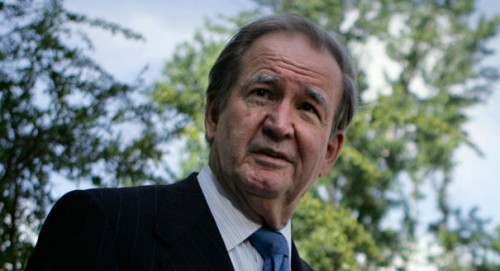Last summer, in this capital of gridlock, a miracle occurred.
The American people rose as one and told the government of the United States not to drag us into another Middle East war in Syria.
Barack Obama was ready to launch air and missile strikes when a national uproar forced him to go to Congress for authorization. Congress seemed receptive until some Hill offices were swarmed by phone calls and emails coming in at a rate of 100-1 against war.
Middle America stopped the government from taking us into what even the president now concedes is “somebody else’s civil war.”
This triumphal coming together of left and right was a rarity in national politics. But Ralph Nader, in “Unstoppable: The Emerging Left-Right Alliance to Dismantle the Corporate State,” believes that ad hoc alliances of left and right to achieve common goals can, should, and, indeed, shall be our political future.
To call this an optimistic book is serious understatement.
Certainly, left and right have come together before.
In “Those Angry Days,” Lynne Olson writes of how future presidents from opposing parties, Gerald Ford and John F. Kennedy, backed the America First Committee to keep us out of war in 1941, and how they were supported by the far-left Nation magazine as well as Colonel Robert McCormick’s right-wing Chicago Tribune.
Two decades ago, Ross Perot and this writer joined Ralph and the head of the AFL-CIO to stop NAFTA, a trade deal backed by America’s corporate elite and its army of mercenaries on Capitol Hill.
Congress voted with corporate America — against the country.
Result: 20 years of the largest trade deficits in U.S. history. Transnational corporations have prospered beyond the dreams of avarice, as Middle America has seen its wages frozen for a generation.
In 2002, Hillary Clinton and John Kerry joined John McCain and George W. Bush in backing war on Iraq. Teddy Kennedy and Bernie Sanders stood with Ron Paul and the populist and libertarian right in opposing the war.
The Mises Institute and The American Conservative were as one with The Nation in opposing this unprovoked and unnecessary war.
The left-right coalition failed to stop the war, and we are living with the consequences in the Middle East, and in our veterans hospitals.
As America’s most indefatigable political activist since he wrote “Unsafe at Any Speed” in 1965, Ralph is calling for “convergences” of populist and libertarian conservatives and the left — for 25 goals.
Among these are many with an appeal to the traditionalist and libertarian right:
—Break up “Too Big to Fail” banks. Further direct democracy through use of the initiative, referendum and recall.
—End unconstitutional wars by enforcing Article 1, Section 8 of the Constitution, which gives Congress alone the power to declare war.
—Revise trade agreements to protect U.S. sovereignty. End “fast track,” those congressional surrenders of constitutional authority to amend trade treaties negotiated by the executive.
From the subtitle, as well as text, of his most recent book, one may instantly identify whom it is Ralph sees as the main enemy. It is megabanks and transnational corporations without consciences whose highest loyalty is the bottom line, the kind of men Jefferson had in mind when he wrote: “Merchants have no country. The mere spot they stand on does not constitute so strong an attachment as that from which they draw their gains.”
Where such men see a $17 trillion economy, we see a country.
Undeniably, there has been a growing gap and a deepening alienation between traditional conservatives and those Ralph calls the “corporate conservatives.” And it is not only inside the conservative movement and the GOP that the rift is growing, but also Middle America.
For America never voted for NAFTA, GATT, the WTO, mass immigration, amnesty, or more H-1Bs to come take the jobs of our workers. These votes have been forced upon members of Congress by leaders carrying out their assignments from corporate America and its PACs, which reward the compliant with campaign checks.
Both parties now feed at the same K Street and Wall Street troughs. Both have oligarchs contributing tens of millions to parties and politicians who do their bidding.
In 1964, a grassroots conservative movement captured the Republican Party and nominated Barry Goldwater. In 1972, a grassroots movement of leftist Democrats nominated George McGovern.
Neither movement would today survive the carpet-bombing of big money that would be called in if either came close to capturing a national party, let alone winning a national election.
Because they have principles and visions in conflict, left-right alliances inevitably fall out and fall apart. Because they are almost always on opposite sides of disputed barricades, it is difficult for both to set aside old wounds and grievances and come together.
A social, moral, and cultural divide that did not exist half a century ago makes it all the more difficult. But if the issue is keeping America out of unnecessary wars and restoring American sovereignty, surely common ground is not impossible to find.





 del.icio.us
del.icio.us
 Digg
Digg